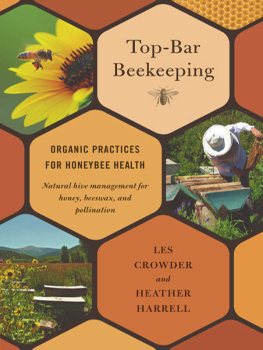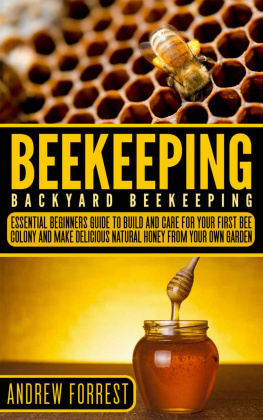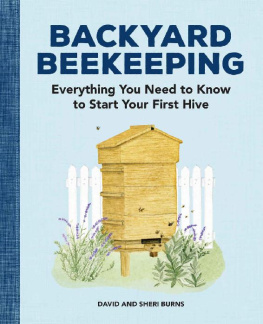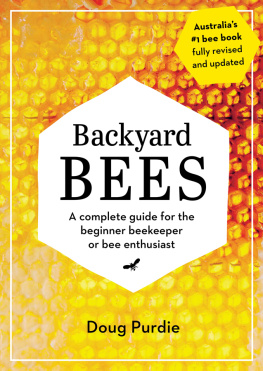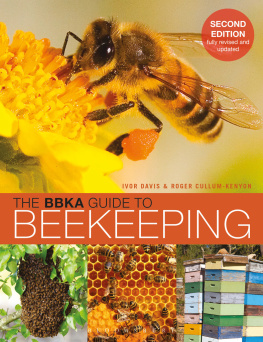KEEPING BEES
IN TOWNS & CITIES
KEEPING BEES
IN TOWNS & CITIES
LUKE DIXON


Instead of dirt and poison, we have chosen to fill our hives with honey and wax, thus furnishing mankind with the two noblest of things, which are sweetness and light.
Jonathan Swift
Title page photograph
Hackney City Farm, London
Copyright 2012 by Luke Dixon. All rights reserved.
Published in 2012 by Timber Press, Inc.
2 The Quadrant | The Haseltine Building |
135 Salusbury Road | 133 S.W. Second Avenue, Suite 450 |
London NW6 6RJ | Portland, Oregon 97204-3527 |
timberpress.co.uk | timberpress.com |
ISBN-13: 978-1-60469-287-7
Printed in China
Library of Congress Cataloging-in-Publication Data
Dixon, Luke.
Keeping bees in towns and cities / Luke Dixon. 1st ed.
p. cm.
Includes index.
ISBN 978-1-60469-287-7; 978-1-60469-378-2
1. Bee culture. 2. Urban agriculture. I. Title.
SF523.D58 2012
638.1dc23
2011050645
A catalogue record for this book is also available from the British Library.
CONTENTS

INTRODUCTION

If you have room for a composter or a water barrel, you have room for a beehive.
The Paris Opera house
A life lived in the a city can be one far away from the concerns of the natural world. The day is dictated by the clock and the commuter timetable, the light is artificial, we are sheltered from the weather, and underfoot concrete and tarmac are hard against our feet. It is easy to imagine that the wild world has been kept at bay, far from the urban sprawl. But the untamed creatures are there as they have always been, and as our towns and cities have grown and man has become an urban animal, so those other creatures who have always lived on the land have found different ways and places to live as man has encroachedfoxes, badgers, mice, and others much less obvious have all adapted to city life. So have bees and there can be few better ways of maintaining a connection with the natural world than by keeping a hive in the middle of the city.
Man and honey bee have always lived in close proximity. As man has felled the trees and built over the land, the bees have had to find other places to make their homes and have moved into chimneys and wall cavities, church spires and attics. As long as there have been towns there have been urban bees, and as long as man has been keeping bees there have been urban beekeepers.

The roof of the barracks of the Port-Royal in Paris
Until recently there has been something secretive about the keeping of bees in towns and cities. Anxious to avoid fear and censure, people have kept their bees for the most part away from public gaze, very often up above the city streets on roofs and balconies. Some countries have laws against it (no one can keep bees inside the city limits of a Spanish town). In New York the keeping of bees was forbidden until the spring of 2010 when public anxiety at the plight of the honey bee saw the anti-bee statutes revoked, though guerrilla beekeepers had been quietly tending hives in the city for decades before.
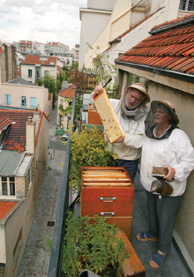
A balcony in Paris
Londoners have always kept bees. There has been an association for beekeepers in the city since 1883. A century ago there were an estimated one million managed colonies of bees in Britain. Now the figure is a quarter of that but is growing again. It has been the decline of the honey bee and our increasing awareness of our dependency on it that has been in large part responsible for the growing twenty-first-century interest in bees and beekeeping. As England became urbanised, bees became fewer. Before the industrial revolution some think that every second or third dwelling had a beehive. As the cities encroached on the countryside many of those hives disappeared. Others just moved upwards onto roofs.

A Paris garden
Renewed interest in urban beekeeping had yet to take root when I began keeping bees a decade ago. I had spent my life till then working in the theatre, indoors in the darkness, making plays and sometimes going for weeks on end without seeing daylight. It was the need for something quieter, more peaceful, more natural in my life that reawakened my interest in bees, a fascination I can recall when as a small child I watched the bees in an observation hive in our local museum in north London. The image of the bees flying in and out through the small hole in the glass window which gave them access to the hive from the outside world has stayed with me ever since. I remembered those bees when many years later I was searching for a hobby that would take me away from the often irksome human egos of the rehearsal room, to the open air and something more contemplative. I searched around and found an evening class in beekeeping. Once I had finished the short course, met many of Londons urban beekeepers, and become confirmed in my desire to have a hive or two of my own, I had to find somewhere that I could keep them.

New York rooftop apiary
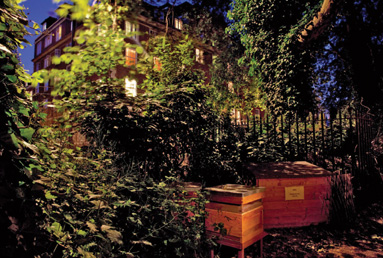
Beehives at night in Corams Fields, London
Living in the middle of Soho, in the very heart of the West End of London, I found my neighbours none too enthusiastic about my plan to put a hive on the roof. The members of my local beekeepers association, who had taught my course, had their hives in all manner of places. Most were in gardens large and small, many were on allotments, and some were on rooftops. It seemed that you could keep a hive pretty well anywhere. As I met more London beekeepers I found hives in ever smaller spaceswedged onto balconies on council flats, outside French windows in minuscule Victorian gardens, and perched on roofs. It was clear that if you have room for a composter or a water barrel, you have room for a beehive.
As I visited the hives of others, I learnt what to consider in choosing a suitable site. You do not need much space, just enough for the footprint of the hive and room around it for the beekeeper to work without being cramped and with space enough for the bits of the hive when it is taken apart to inspect the bees within. You need some security. The biggest threat to the urban bee, I was told, was the urban vandal. Otherwise the bees can look after themselves. Like us, they need a home and plenty to eat and drink. If the beekeeper provides the home, the bees will seek out pollen and nectar to feed on and find sources of water to drink. The city offers more variety of forage than the countryside ever can, which, combined with its warmer climate, means that the urban environment is perhaps better suited to the modern bee than the rural environment is. The more beekeepers I met, the more I realised how straightforward urban beekeeping could be if only you have a place for your hives.
Next page

